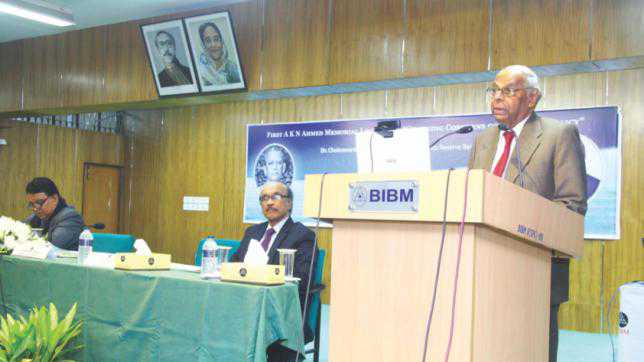Central banks should help build appropriate financial institutions
23 January, 2018

Central banks, particularly in developing economies, have a special responsibility in helping to create appropriate financial institutions, said a former governor of the Reserve Bank of India (RBI).
C Rangarajan said financial inclusion has become an issue of critical importance in recent years because of the failure of the system meant to reach out to small borrowers and vulnerable groups.
“The Reserve Bank of India and the Bangladesh Bank have played a key role in discharging this responsibility and this must continue,” he said while presenting a lecture at the Bangladesh Institute of Bank Management (BIBM) in Dhaka on Sunday.
The AKN Ahmed Memorial Lecture was on “Changing Concerns of Monetary Policy”.
AKN Ahmed was Bangladesh Bank's second governor, responsible for laying its foundations at a time when the country was passing tough times.
“He skilfully managed to restore stability in the financial system,” said Rangarajan, also the former chairman of the economic advisory council to the prime minister of India.
He said monetary policy has emerged as an important tool of economic policy both in developed and developing economies.
The monetary and financial system is far more complex today than it has been in the past. Financial intermediation has reached a high level of sophistication, which has itself become a source of concern in recent days, he said. The menu of available financial products has expanded enormously. Derivative products, which were unknown till a few decades ago, have become common. “All these changes have an important role to play in relation to the transmission mechanism,” said Rangarajan.
Speaking about the central bank's ability to effectively implement an inflation mandate, he said monetary policy must come into effect irrespective of what triggered inflation.
“Obviously, supply-side management is needed in situations of supply stock and that should be the responsibility of the government.”
According to Rangarajan, exchange rate stability and financial stability of late have emerged as competing objectives. However, the framework must be such that large interventions to stabilise the exchange rate have to be an exception rather than the rule.
He said monetary policy and fiscal policy running in different directions can impose a burden on the economy.
“There has to be a close dialogue and coordination between the central bank and the government,” he said.
At the same time, Rangarajan said there was some advantage in specifying the areas in which the central bank has a clear mandate.
“Central banks like the RBI and Bangladesh Bank perform multiple functions. They are not only monetary authorities but also regulators of the banking system.”
Among the various objectives such as price stability, growth, and financial stability, the dominant objective for central banks, particularly in developing economies, must be price stability, said Rangarajan.
He said central banking was no longer the application of well-known tools to well-known problems. The issues that surface are complex. “We need to continually enlarge our knowledge and understanding of how the economy functions and how the different participants of the economy react to policy changes,” he said.
“Successful central banks are those which respond to problems with speed, tact and intelligence,” he added.
Fazle Kabir, governor of Bangladesh Bank, said, “Maintaining financial stability is also our priority as we believe in a nexus between financial development and economic growth.”
“In this respect, Bangladesh Bank has given considerable focus on macro-prudential policy,” he said.
He said financial inclusion has received policy priority from the BB in order to build a strong foundation of financial infrastructure, reduce the economic vulnerability of households, alleviate poverty and improve the quality of peoples' lives and hence promote economic growth.
Kabir also said it was to be recognised that the BB cannot contain inflation and achieve expected growth unless complemented by the government, regulators of other wings of the financial system, banks and financial institutions.
TAG(s):
